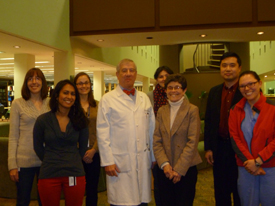
History of Medicine elective leaders Ellen More and Richard Glew (third and fifth from right) with 2012 class members (from left) Caroline Royer, Sumathi Narayana, Kathryn Reiser and Jennifer Perez, and guest faculty member Weiru Shao, MD, assistant professor of otolaryngology, with guest medical student Emily Chen. Not pictured are medical students Jennifer Evansmith and Bree Huning and GSBS student Yuxin Chen.
Why would students training for a future at the cutting edge of health care want to look back in time? For those who understand that the history of medicine holds useful lessons for their profession, the History of Medicine elective at UMass Medical School is a valuable course selection.
“As a history major in college, I loved learning about particular themes or patterns that have occurred throughout history. There is so much to learn from past mistakes, and we run the risk of repeating them if we overlook them,” said Caroline Royer, SOM ’16. I signed up for this elective because I wanted to gain a deeper awareness of the profession I have chosen, particularly the social and cultural influences on practicing medicine.”
“Through a better understanding of medical history, students can gain needed perspective on the social, professional, economic and moral climate in which they will be practicing,” agreed course co-founder Ellen More, PhD, professor of psychiatry and head of the Office of Medical History and Archives at the Lamar Soutter Library. “We want students to see the history of medicine as something that contributes to their own sense of professional development, and helps them understand their own place in medical history.”
The History of Medicine seminar series is an optional enrichment course offered as a pass/fail credit elective to students in the School of Medicine and a non-credit elective for GSBS and GSN students. Participants meet every two weeks for six sessions each fall, each one organized as a small-group seminar with instructors’ narrative followed by presentations by students or guest lecturers and open discussion. The class has focused on a different topic or theme of its choice each year.
Dr. More established the course five years ago along with Richard Glew, MD, professor of medicine and microbiology & physiological systems and vice chair of undergraduate medical education for the Department of Medicine, and former faculty member Thomas Cropley, MD. More and Dr. Glew continue to co-instruct the course, and have fine-tuned it over time. “Students initially chose from a list of suggested topics, but requested more focus, so beginning last year, we choose a work of medical non-fiction as a driver for discussion,” explained More. “We start off discussing the book, then branch into related topics in more depth.”
This year’s topic was infectious disease, as illustrated in the book Better: A Surgeon’s Notes on Performance, by physician and medical writer Atul Gawande, MD. In the aptly named Better, Dr. Gawande documents, through a series of essays organized by the principles of “diligence, doing right and ingenuity,” how doctors strive to become better at what they do—often in matters of life or death. In their presentations on the history of individual infectious diseases, students identify and analyze these necessary components for medical advances.
Examples included ingenuity in ancient China’s attempts at a smallpox vaccine; the diligence of 19th century British physician John Snow, known as the father of modern epidemiology because he figured out how to contain a cholera epidemic; and doing right despite widespread panic to learn as quickly as possible how HIV spreads—and doesn’t spread—so that nurses and doctors could provide care, and scientists could fast-track discovery of the lifesaving retroviral drugs.
While such weighty topics are the focus of the History of Medicine, as an elective that brings humanities into medical education—especially the science-heavy first and second years of medical school—it also offers a refreshing change of pace.“It is something other than the dense material that is packed in to all their courses, a diversion and a de-intensifier,” said Glew. “For students focused on what is relevant today and what they’ll be tested on next week, the history of medicine course says stop, let’s go back and see how we got here. It allows them to reflect on the noble career they are entering.”
“I was drawn to this course as a way to balance my experience as a first-year medical student,” said Katie Reiser, SOM ’16. “Drs. More and Glew and the other students offer a global perspective that really complements our science-based courses.”